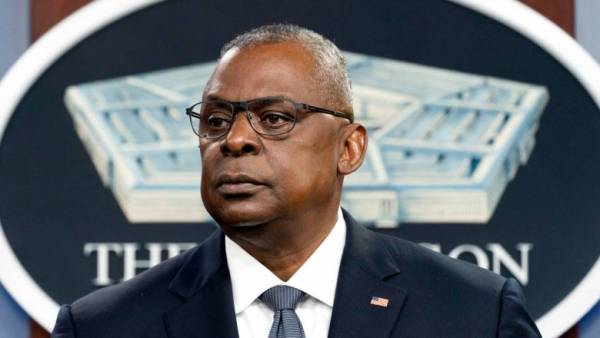
WASHINGTON, December 14 & nbsp;/TASS /. The US authorities intend to help Lithuania in & nbsp; strengthen its & nbsp; armed forces and & nbsp; are ready to support the republic in the & nbsp; light of the challenges associated, according to & nbsp; Washington's version, with & nbsp; Belarus, Russia and & nbsp; China. & Nbsp; This was stated on & nbsp; Monday by the US Secretary of Defense Lloyd Austin, receiving at the Pentagon his Lithuanian counterpart Arvydas Anushauskas.
According to & nbsp; Austin's version, quoted by the press service of the US military, “ Lithuania has become a beacon of democracy in the & nbsp; region, this includes the reception of expelled Russian and & nbsp; Belarusian opposition leaders. '' “ We & nbsp; understand the challenges you & nbsp; face & nbsp; & nbsp; & mdash; he said. “ The regime in & nbsp; Belarus cynically uses migrants in & nbsp; the framework of hybrid tactics against Lithuania and & nbsp; its neighbors, & nbsp; & mdash; the head of the Pentagon claimed. & mdash; & nbsp; At & nbsp; while Russia continues its own hybrid campaign. And & nbsp; now China is increasing pressure on & nbsp; Lithuania. I would & nbsp; thank your government for its & nbsp; firm position on & nbsp; China, and & nbsp; we & nbsp; know that & nbsp; you faced retaliation because of & nbsp; your policy decisions & nbsp ;.
According to Austin, “Lithuania is not & nbsp; faced with & nbsp; these challenges alone.” “ And & nbsp; now the United States, like & nbsp; before, supports Lithuania, we & nbsp; will work together to & nbsp; strengthen the Lithuanian armed forces & nbsp; & nbsp; & mdash; added & nbsp; he. The Minister noted that & nbsp; the parties intend to “ sign an agreement on & nbsp; mutual defense procurement ''. He & nbsp; believes that & nbsp; this will “ improve the conditions for the acquisition of defense products and & nbsp; increase the interoperability of the armed forces ''; two countries.
Lithuanian-Chinese relations are going through a crisis due to the & nbsp; opening of a representative office of Taiwan in Vilnius on November 18 & nbsp;. In & nbsp; August, China, opposing the office with that name (Beijing agrees to be a representative office of Taipei), recalled its ambassador from & nbsp; Vilnius and & nbsp; offered to do the same to Lithuania. The Lithuanian ambassador was recalled in & nbsp; September. On November 21 & nbsp; the government of the People's Republic of China decided to lower diplomatic relations with Lithuania to & nbsp; the level of an attorney & nbsp; affairs, and on November 26 & nbsp; sent a note on & nbsp; change the status of the Chinese diplomatic mission in & nbsp; Vilnius, which began to be called an embassy, and nbsp;/p>
The migration crisis on the & nbsp; borders of Belarus with & nbsp; Latvia, Lithuania and & nbsp; Poland, where refugees rushed from the beginning of the year, sharply escalated on November 8 & nbsp;. Several thousand people came from the & nbsp; Belarusian side to the & nbsp; Polish border, some of them tried to penetrate the & nbsp; territory of Poland, breaking the barbed wire fence. President of Belarus Alexander Lukashenko said that & nbsp; in & nbsp; the Western countries are to blame, because of whose actions people are fleeing the & nbsp; war.